 |
 |
| |
Selected Development Project |
| |
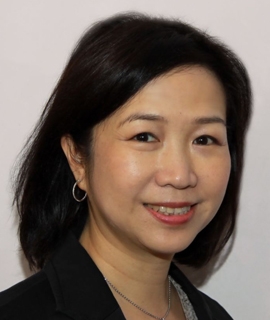
|
| Project Title |
School-STEM Professionals Collaboration: Impact on teachers’ conceptions and students’ attitudes towards STEM
學校-STEM專業人士合作:如何影響教師的STEM教育觀念和學生的STEM教育態度 |
|
|
| |
| Principal Investigator |
Professor Winnie So Wing-mui |
|
|
|
|
|
| |
| Project Period |
|
|
| Objectives |
- To investigate the effect of the professional development (PD) programme “School-STEM Professionals Collaboration” on teachers’ conceptions of STEM and STEM education
- To identify the factors influencing the implementation of STEM education with
authentic STEM inquiry activities in General Studies
- To examine the change in primary students’ attitudes as a result of their engagement
in authentic STEM inquiry activities
|
|
|
| Methods Used |
| A three-phase design-based study was implemented with collaboration of school teachers, educators and STEM professionals in a PD programme focusing on the design of authentic STEM activities. Pre-study and post-study comparisons were employed to examine the effectiveness of the PD programme in creating changes for both teachers and students. The investigation of teachers’ change in conceptions of STEM education involved the use of mind maps and interviews. Factors influencing the implementation of STEM activities in the classroom were identified through lesson observations. Changes in students’ attitudes towards STEM were studied by pre- and post-questionnaire, drawings of STEM professionals and interviews.
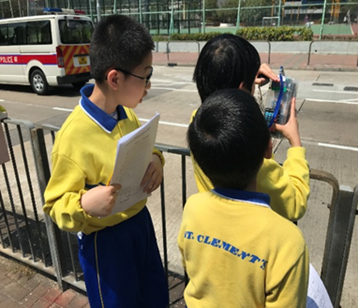
Students were using data-loggers to detect PM2.5 in air outside the school
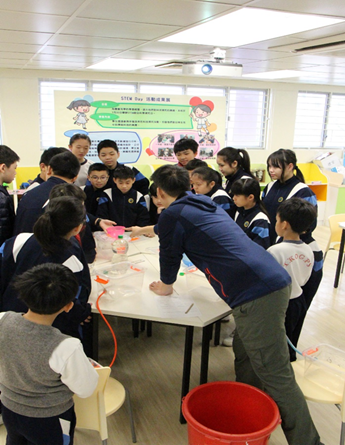
Students were testing the drainage works
|
| Summary of Findings |
- The involvement of school teachers in the “School-STEM Professional Collaboration” PD programme improved teachers’ understanding of STEM careers and STEM professionals in students’ STEM education and the understanding of teachers’ role in students’ STEM career understanding and interest.
- The framework to implement “School-STEM Professionals’ Collaboration”, including (1) Preparation, (2) Communication, (3) Key points for STEM authentic design, (4) Preparation for STEM lessons, and (5) Reflection was developed for reference in further studies.
- Participated primary school students did not have adequate prior understanding of professionals in STEM fields such as water engineering, food safety, or environmental protection. It was also found that less stereotypes of STEM professionals predicted more career interests in STEM fields among students.
- School-STEM Professional Collaboration showed positive impacts on students’ understanding and interests. Particularly, introducing female STEM professionals were more likely to benefit girls.
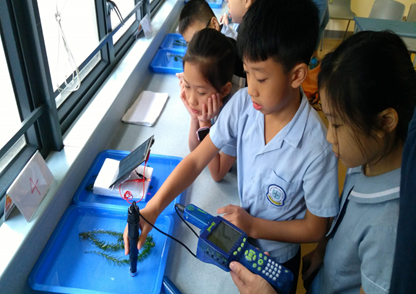
Students were using data-logger and dissolved oxygen analyzer to test water quality
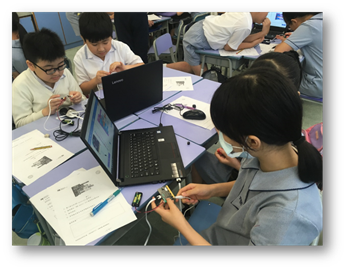 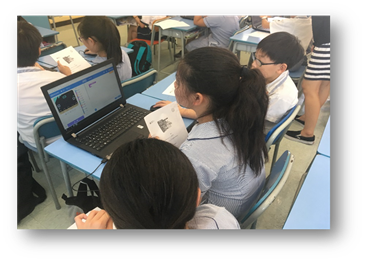
Students were working on coding tasks with Micro:bit for food temperature sensors
|
| Impact |
- The research findings with evidence from the quantitative and qualitative data provided baseline information and suggestions for research and instructional efforts in the planning and implementation of future STEM education at primary level.
- Teachers were able to understand their roles in enhancing students’ STEM career understanding and interest.
- The different impacts of the School-STEM Professional Collaboration on girls and boys provided insights for further study to examine the necessary support needed on girls in STEM education.
|
| Selected Output |
Published and accepted for published
So, W. M. W.*, Chen. Y., & Chow C. F. S. (2020). Primary school students’ interests in STEM careers: how conceptions of STEM professionals and gender moderation influence. International Journal of Technology and Design Education. https://doi.org/10.1007/s10798-020-09599-6
Cheng, Y. C.* & So, W. M. W. (2020). Managing STEM Learning: A Typology & Four Models of Integration. International Journal of Educational Management. 34(6), 1063-1078.
So, W. M. W.*, Chen. Y. (2019). School – STEM professional collaboration: improving students’ STEM career interests (In Chinese). Digital education in primary and secondary schools, 15, 25-28.
So, W. M. W.*, He, Q. W., Chen Y. & Chow, C. F. S. (2020). School-STEM Professionals' Collaboration: A Case Study on Teachers’ Conceptions, Asia-Pacific Journal of Teacher Education. https://www.tandfonline.com/doi/full/10.1080/1359866X.2020.1774743
Under Review and Preparation
So, W. M. W., & Chen. Y. (Under preparation). Teachers’ concerns for STEM education.
So, W. M. W., Chen. Y., & Chow C. F. S. (Under review). Effective STEM Instruction through School-STEM Professional Collaboration. Asia Pacific Journal of Education.
Conference Presentations So, W. W. M., He, Q. W., & Chen, Y. (2019, August). Changes in Teachers’ Conceptions in School-STEM Professional Collaboration. Paper presented at the World Education Research Association 2019 Focal Meeting (WERA 2019), Tokyo, Japan.
So, W. M. W., Chen. Y., & Chow C. F. S. (2019, April). Students’ STEM stereotypes and attitudes: the impacts of a School-STEM Professionals’ Collaboration programme. Paper presented at the 2019 Annual Meeting of American Educational Research Association (AERA 2019), Toronto, Canada.
So, W. W. M., & He, Q. W., & Chen, Y. (2018, December). School-STEM Professionals Collaboration: Impact on Teachers’ STEM Perceptions. Paper presented at the 2018 International Conference of East-Asian Association for Science Education (EASE 2018), Taiwan, China. |
| Biography of Principal Investigator |
Professor So is currently a Professor in the Department of Science & Environmental Studies and Director of the Centre for Education in Environmental Sustainability. She has rich experience in teaching undergraduate, postgraduate diploma, Master of Education, Doctor of Education and PhD programmes, in the areas of Science & Environmental Education, General Studies and Liberal Studies.
Prof. So’s main research areas are: STEM education, inquiry learning in science and environmental education, integrating Information Technology and teacher development in Science/ General Studies/ Liberal Studies. She has been the principal investigator of various research projects funded by the General Research Fund, Public Policy Research Fund, Quality Education Fund and the Education Bureau. Prof. So has extensive academic articles, chapters, books and multimedia publications on science learning. She is now on the editorial board of the South African Journal of Education and the Asia-Pacific Forum on Science Learning and Teaching, and as reviewer for several international journals.
Internationally, she was the President of the Asia Pacific Educational research Association (APERA) during 2014-2016, a serving executive member of the World Education Research Association (WERA) and the East Asian Science Education Association (EASE) till 2016.
Locally, she has been appointed member of the Humanities and Social Science Panel of the Research Grants Council of Hong Kong since 2011, the member of the steering committee of the TIMSS since 2013, member of the Assessment Working Group of the Chief Executive’s Award for Teaching Excellence (2019/20 for Liberal Studies; 2018/19 for General Studies; 2012/13 for Science Education), member of the Science Museum Advisory panel of the Home Affairs (2014-16), member of the Food Wise Hong Kong Steering Committee of the Environment Bureau since 2014, member of Endangered Species Advisory Committee since 2016, member of the Advisory Committee of the Hong Kong Academy for Gifted Education since 2014, co-opted member of the Scientific Sub-committee (SSC) of Ocean Park Conservation Foundation since 2017. She has been serving as a member of the Curriculum Development Council during the 2000s (Science Education, Liberal Studies and General Studies). She has also contributed to school management of local schools. Prof. So has been the executive member of the Hong Kong Educational Research Association for more than 10 years. She is also the convenor of a large scale inter-school event “Primary STEM Project Exhibition” since 1998. |
Funding Source |
General Research Fund |
|
|
 |
|
 |


